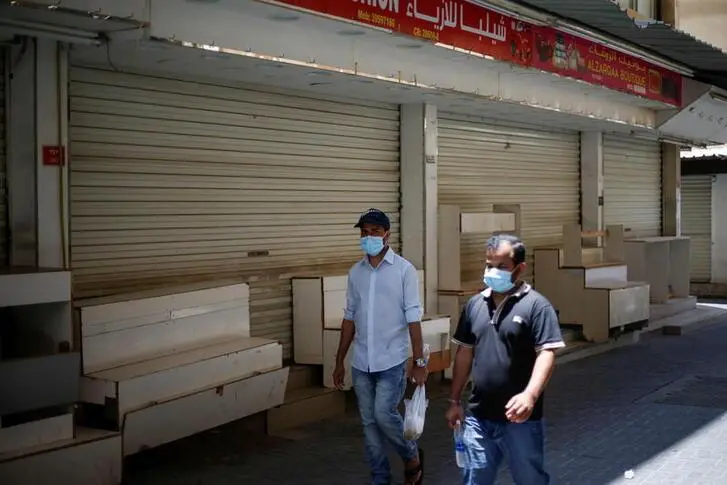PHOTO
Bahrain's experience during the Covid-19 pandemic and Team Bahrain’s speed and efficiency were highlighted in a regional report released today for other Arab countries to consider.
The 2022 State of Arab Cities Report crowns a multi-year continuous co-operation between the Bahrain Centre for Strategic, International and Energy Studies (Derasat), Arab Countries Regional Office of the United Nations Human Settlements Programme (UN-Habitat) and the United Nations Development Programme (UNDP).
Titled ‘Sustainable Funding for the Urban Infrastructure’, the report is a regional first to be published in Bahrain specifically for urban planners and those interested in various aspects of city living and development.
Following the success of the first version of the State of Arab Cities Report issued in Kuwait in 2012, Derasat was keen to contribute to preparing a new qualitative report reflecting the latest developments in urban intellect in light of Bahrain’s interest in sustainable development goals.
“The report is a trusted reference for all urban planners interested in Arab affairs with qualitative proposals to support the decision-making process in countries of the region and utilising urban planning based on global best practices for Arab cities that underwent massive expansion with large social transformation which affected the region,” said Derasat Board of Trustees chairman Dr Shaikh Abdulla bin Ahmed Al Khalifa.
“Huge efforts went into research and fieldwork based in knowledge and methodological frameworks which reflect the reputed parties that co-operated to accomplish the report, making it a guide to the challenges facing Arab cities and their various circumstances.
“This co-operation reflected the trust invested by international organisations in Derasat and its accumulative achievements in recent years which made it an experienced and trusted partner through its expertise and capabilities.
“This helped the centre complete a comprehensive study on Arab cities and their impediments, with a particular focus on sustainable funding for urban infrastructure – a major concern among overlapping priorities facing those who oversee the development process in the Arab region.”
Dr Shaikh Abdulla praised Bahrain’s successful strides in urban development and infrastructure to improve the quality of life for its population, as well as enhance their ability to participate and demonstrate productivity.
He also added that ‘Bahrain’s achievements were realised through a wise vision that led to an exceptional and unique state of responsible and sustainable urban planning reflecting Bahrain’s proactive foresight under various challenges and opportunities’.
The report includes the latest urban statistics and data analyses for Arab cities aiming to reach conclusions and recommendations for their urban planning, as well as increasing the understanding for the challenges they face.
This will contribute towards enhancing the role of urbanisation in pushing ahead sustainable development in the Arab region, added Dr Shaikh Abdulla.
“The 2022 State of Arab Cities Report aims to assess the economic and financial frameworks of Arab countries at the regional and local levels related to financing infrastructure in urban areas and prospects for unlocking their growth potential and stimulating their prosperity,” said an official statement released by Derasat yesterday.
“The report will contribute to the implementation of the 2023 UN Sustainable Development Plan and the New Urban Agenda in the Arab region by promoting evidence-based urban policies and improving the living conditions for urban dwellers in Arab countries.
“The report also reviews Bahrain’s experience in dealing with the Covid-19 pandemic and Team Bahrain’s reputed speed and efficiency verified by numerous international organisations led by the World Health Organisation (WHO) which drew attention to several lessons learned that were scientifically monitored, analysed and shared within the framework for this report so that other Arab countries can benefit.
“The report praised Bahrain’s efforts and its innovative approaches in responding to the pandemic, noting that the kingdom has launched a financial package that exceeded BD4.5 billion to support the economic and commercial sectors.
Measures
“Bahrain also took several rapid measures to confront the pandemic, including exempting consumers from paying bills and although residents, companies and organisations were affected by the pandemic they were exempted from paying electricity and water bills for three months.
“Banks were asked to increase their lending capacity to about BD3.7bn in order to postpone instalments or provide additional financing to customers.”
According to Derasat, the report confirmed the strength of the partnership between Bahraini institutions and United Nations organisations, as well as Bahrain’s high rank in the field of digital infrastructure – one of the pillars of Bahrain’s economy playing a pivotal role in attracting global capital.
The ceremony to launch the report will be held today at the Sofitel Bahrain Zallaq Thalassa Sea and Spa.
Copyright 2022 Al Hilal Publishing and Marketing Group Provided by SyndiGate Media Inc. (Syndigate.info).





















